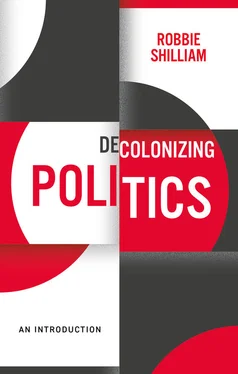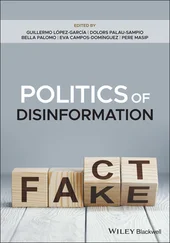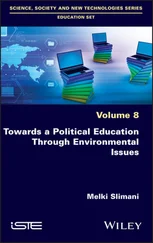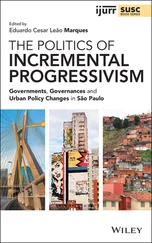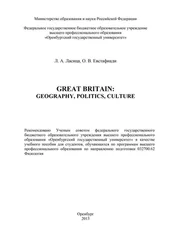Let me now sketch out for you the chapters that follow.
In chapter 2we investigate the subfield of political theory. We focus on the question of what it means to be human, and how the capacity to reason is implicated in this question, especially as it pertains to the justification of rights. Political theory draws upon conversations that took place in the eras of the European Renaissance and subsequent Enlightenment. We consider how, in these eras, imperial expansion brought Europeans into contact with a diverse array of peoples, cultures, and practices. This diversity was tamed, if you like, by way of a fundamental philosophical distinction being made between properly human and not-properly human beings.
We engage specifically with the philosophical and anthropological writings of Immanuel Kant, and tease out the colonial logics of difference that accompanied his conception of the human. I’ll be suggesting to you that the universal rights of which Kant boasts are only universal to those racially defined as properly human. We then grapple with the work of Sylvia Wynter, a Jamaican scholar of the humanities. Wynter is concerned with many of the same themes as Kant. But she arrives at a very different conclusion. Wynter seeks a conception of the human being that no longer rests upon the colonial and racist logic that distinguishes the properly human from the non-properly human.
In chapter 3we turn to the subfield of political behavior. This subfield seeks to uncover how citizens engage with the political process and how that process responds to citizens. We begin our analysis in the late-nineteenth-century context of expanding empire and industrial urbanization in both Britain and the USA. In this era, scholars worried that the increasing movement and mixing of different peoples would negatively impact the quality of democracy. In response, they developed a race science that attributed the inheritance of degenerative abnormal behaviors to some races and the inheritance of progressive “normal” political behavior, conducive to an orderly democratic process, to the white Anglo-Saxon race. This science was informed by eugenics.
As part of this examination we look at the work of a set of scholars: Walter Bagehot, the British editor-in-chief of the Economist magazine, Woodrow Wilson, President of the United States, and John Watson, an American psychologist famous for coining the term “behaviorism.” I’m going to make the argument that even if they refuted eugenics, all of these figures accepted the race logics of the science of heredity. We then explore a very different resolution to the division of citizenship into those who display normal versus abnormal political behavior. Frantz Fanon, a black clinical psychiatrist from Martinique, sought in his Algerian medical practice to repair the egos and psyches of those who had been made abnormal by structures of colonial rule. He envisaged a French citizenry that brooked no racial division on grounds of heredity.
In chapter 4we address the subfield of comparative politics. We focus especially on the way in which comparativists have examined the distinctions between non-democratic and democratic societies and the varied paths of “political development” from one system to the other. Specifically, we track the colonial logic that inheres in what I will call the “paradox of comparison.” This phrase references how difference might be accepted analytically, that is, as part of the way in which you understand human behavior, but disavowed “normatively,” that is, as certain values and practices are set as the norm (the standard) by which all human groups should be evaluated and prepared for assimilation. We follow how scholars created and then re-shaped this paradox over a set of imperial eras from fifteenth-century Spanish colonization to twentieth-century decolonization.
Along the way, we look at the concept of “improvement” proffered by Adam Ferguson, a famous Scottish philosopher of the late eighteenth century; then we turn to the critique of “colonial development” made by famous anthropologist Bronislaw Malinowski in the early twentieth century; subsequently we examine the engagement by the US-based Committee on Comparative Politics with decolonization in the Cold War era. We then contrast the work of this Committee with that undertaken by a group of radical scholars who congregated at Dar es Salaam college, in Tanzania, in the late 1960s. I’m going to show you how Walter Rodney, Giovani Arrighi, and John Saul chose not to analyze developmental differences through a colonially induced paradox of comparison. Rather, they shifted their scope of analysis to the globally unequal relations of exploitation carved out by capitalist imperialism which delivered under-development to some and development to others.
In chapter 5we scrutinize the subfield of International Relations (IR). Unlike most other subfields, IR displays a pronounced pessimism concerning the ability of humanity to enjoy the good life. In the absence of a world state, so the story goes, the logic of “anarchy” tends to lead to war and violence. Some scholars, however, call attention to globalization and the way in which its institutions of global governance mitigate conflict and provide some hope for the prospect of peace. We rethink this argument by retrieving the history of “good imperial governance” and its formative importance for the academic study of international politics. I’m going to make the argument that the pessimism evident in the study of IR is less a result of the logic of anarchy and more a colonial logic concerning the loss of empire.
In the course of this inquiry, we focus on Martin Wight, a very influential theorist of international politics. Wight is famous for introducing the concept of “international society” – a collective of diplomats and statesmen who might mitigate the worst of anarchy and its violent and warlike tendencies. I’m going to show you that Wight based his idea of international society on the British Commonwealth model of good imperial governance, while he increasingly associated the worst elements of anarchy – war and violence – with anti-colonial self-determination. Then we turn our attention to the Nuclear-Free and Independent Pacific movement of the late twentieth century. Led by Pacific women, this peace movement confronted nuclear war, military imperialism, and settler-colonialism as intersecting axes of oppression. I’m going to suggest that peace movements in the service of anti-colonial self-determination provide us with a very different insight into the causes and prospects for peace on a global level.
In the conclusion to the book, we return to Aristotle. Having identified the key colonial logics implicated in the subfields of political science we consider the extent to which Aristotle’s critique of politics can be utilized as a resource for confronting these logics and decolonizing the study of politics. I’m going to argue that while Aristotle was anti-imperial, he nonetheless wished to preserve the patriarchal hierarchies that placed the citizen at the center of the political world and which moved others to the margins. We then put Aristotle in conversation with Gloria Evangelina Anzaldúa (1942–2004), a Chicanx queer theorist, who presents the craft of “border thinking.” With Anzaldúa we evaluate the possibilities of studying politics from the margins with an intention to erase the power hierarchies that consistently recreate centers-with-citizens and marginal-peoples-on-borders.
Конец ознакомительного фрагмента.
Текст предоставлен ООО «ЛитРес».
Прочитайте эту книгу целиком, купив полную легальную версию на ЛитРес.
Читать дальше
